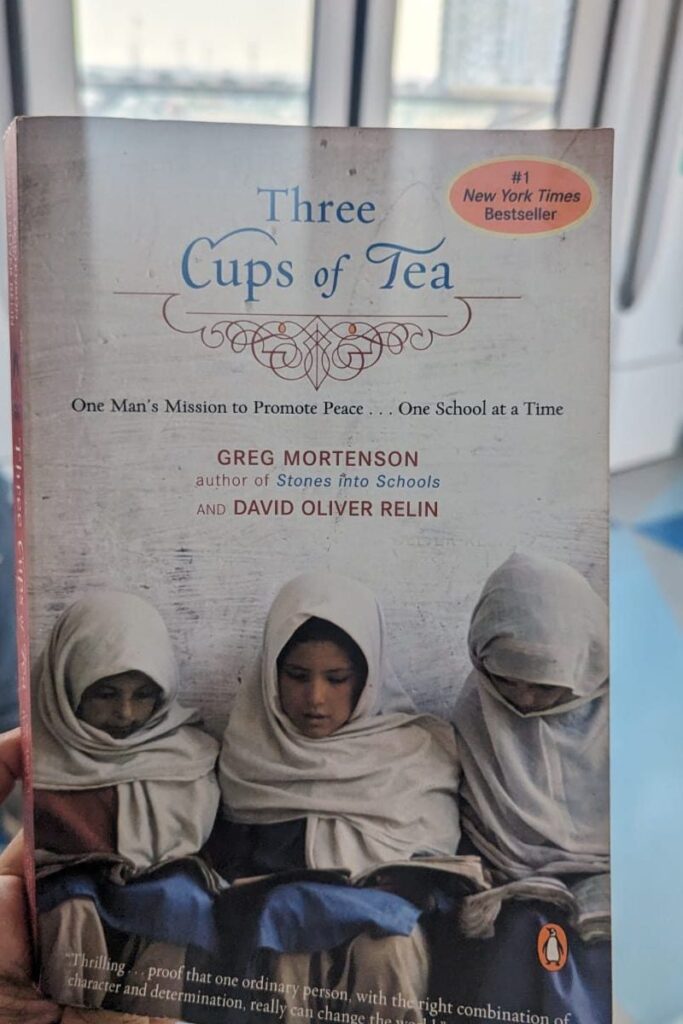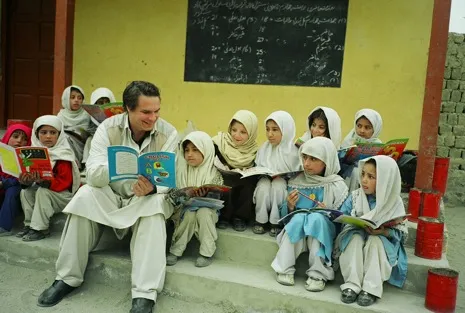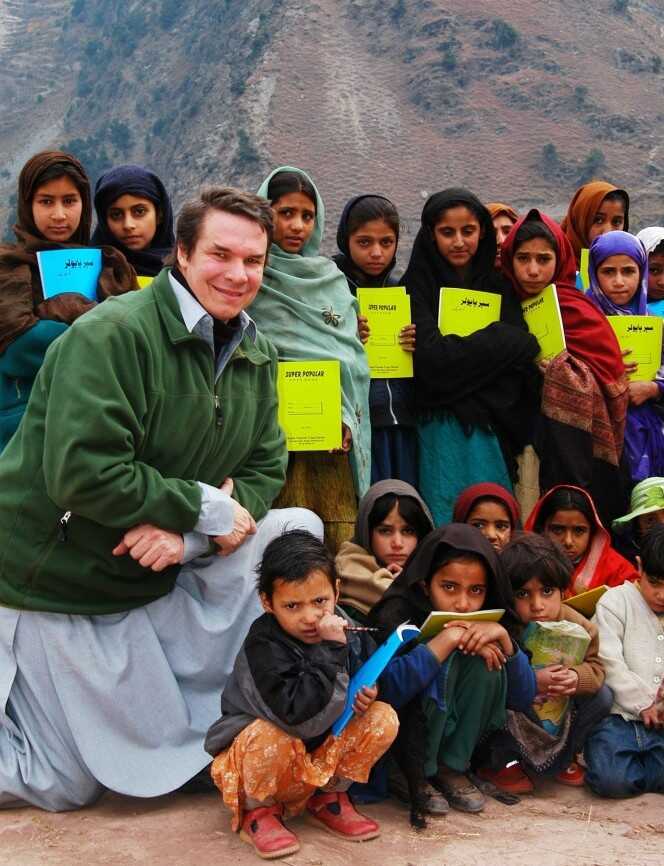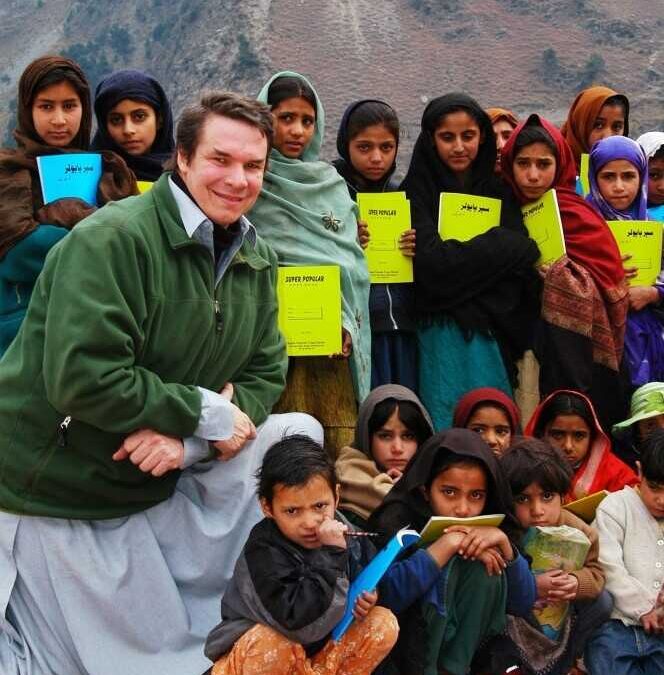I am not an ardent reader of autobiographies, and anything closely related to autobiographies. Recently while cleaning the collection of my books, this particular book caught my eye, “Three Cups Of Tea.” I do not exactly remember when exactly I bought this book, but if my memory is still intact, it is from the Sharjah Used Book Fair.

I caressed the book for a week in my Pandora box handbag, and then on one fine morning in the Dubai metro, I decided to flip the pages. I always check for the language of books if it is unfamiliar. If it is readable for me, voila!
What the book is about!
The book is co-authored between Greg Mortenson and David Oliver Rein. It falls into the category of those books that touch your heart and force you to unlearn your views, spark debate, and remain in your memories for a huge reason. The book opens with an introduction about Greg Mortenson, and how he was found in the remote village of Korphe in Pakistan after a failed attempt to climb Mount K2. He was remarkably touched by the welcoming kindness of the community, which later gave him the strength to build basic education schools in one of the noted dangerous places in Pakistan and Afghanistan. They provided him with food and shelter, and he was moved by their gesture of kindness.
The village head takes him to a mud ground where a huge number of kids practice writing in the mud. He talks about the dream of the village head, who was extremely kind to him, of opening a school for the kids in the village and teaching them the basics of reading and writing at least. In a simple yet profound gesture, he promised to return and build a school for the village’s children. The book then uncovers the struggle and success Gre faced in achieving his mission of opening schools in remote areas. But on many occasions I had truly felt that the book is all about the Author; it is primarily about everything he had accomplished over the years. I fondly remembered the quote by someone that, “A good teacher sitting under a tree can do more than a bad teacher in a new building,”
Controversies and Compassion
The book intensely provides a window into the unique culture and traditions of Pakistan and Afghanistan, which are even new to the civilized society in the country itself. The author once described the reason behind naming the book “Three Cups of Tea.” In these regions, sharing three cups of tea signifies a progression from being a stranger to becoming a friend, and ultimately, a family member.
However, “Three Cups of Tea” is not without its controversies. Some have questioned the accuracy of events portrayed in the book. It was later revealed that certain events were embellished or inaccurately described, leading to accusations of literary fraud. Moreover, allegations arose about the misuse of funds raised for Mortenson’s charity, the Central Asia Institute (CAI). There were concerns that the funds intended for building schools were mismanaged and that Mortenson personally benefited from these donations. These controversies sparked investigations and legal troubles for the author.
I have learned that the co-author of the book, David Oliver Relin, tragically took his own life in 2012, which brings the controversial side of the book and actions to the forefront. Some suggested that the decision to take his own life was, to an extent, due to the controversies surrounding the book.
Talking a bit more about the book, the book is a window to the unique culture and traditions of Pakistan and Afghanistan. He realized how basic education is denied or never reached these remote villages, and he wanted to do his bit to provide education for kids, especially girls in the area. The book also provides us an insight into the challenges faced by humanitarian workers operating in conflict zones and remote inaccessible areas. Under such circumstances, Mortenson’s effort and success in building schools were appreciated internationally.

Quotes from ‘Three Cups of Tea
Unlike fiction, it is very rare to find personal favorite quotes in non-fiction. I find autobiographies completely unattractive to spend my time on. I believe, that if you desire to write an autobiography, you should have the courage and honesty to be neutral to emotions and situations. You should dissect every controversial situation you have faced and have the courage to accept where you went wrong and accept where you went wrong, which is completely unlikely to happen for a human being. My exact point is not to find any favorite quote to stick to in a non-fiction. Even if I noticed a few, it never was my personal favorite.
Three Cups of Tea has a few quotes that caught my attention
1. “Here, we drink three cups of tea to do business; the first you are a stranger, the second you become a friend, and the third, you join our family, and for our family, we are prepared to do anything—even die.
The quote teaches you how local culture and people who live in remote areas value relations and time spent together.
2. “In Pakistan, when you meet someone for the first time, the word out of your mouth should be ‘peace.’ Your first word dictates the entire course of the relationship.”
I felt a close connection to this particular quote. It is been interrupted in many ways, with a few insisting on the Islamic tradition of greeting another with Assalamu Alaikum (Peace be upon you). But I would like to find my bit of interpretation that you would not want anyone to greet you with a negative greeting, especially at present when I am on my heavier side and relations asking, “Oh, you have gone fat again!” Yeah, that kind of hits differently.
3. The third quote is, “Once you educate the boys, they tend to leave the villages and go search for work in the cities, but the girls stay home, become leaders in the community, and pass on what they’ve learned to their children.”
This felt like a trap for me. A polite way to limit a girl’s education to the basics of reading and writing imposing the household duties on her and letting a man take care of the rest from there.
Controversies and Concerns in ‘Three Cups of Tea
However, right from the start of the book, my mind had so many unanswered questions. A lot of the passages felt dramatically exaggerated, just to get the attention of the readers and international organizations. Mortenson describes his arrival at the Korphe village after a failed attempt to climb the mount K2. He was taken by the villagers who provided him with food and shelter. While this is where everything started, I have felt that the details of this initial reception may have been embellished for dramatic effect. Another contradictory part was the timing of his promise to build schools in the village. Reading about the particulars ignited a few questions about the authenticity of the situation. It is just that if he did promise the schools on his first stay or after a later period.
Getting a bit deeper into the book and its backstory, I came to know more about the misuse of funds raised for the charity. A few passages in the book are written in a way to whitewash money mismanagement. Critics claimed that a substantial portion of the funds was used for expenses unrelated to school construction, such as promoting the book and covering personal costs like Mortenson’s travel and accommodations.Then was the mention of Dr. Jean Hoerni. He is the key financial contributor to Mortenson’s mission. However, there have been disputes about the extent of Hoerni’s involvement and whether he was as pivotal in financing the schools as the book suggests. Some have raised questions about whether Hoerni’s contributions were accurately represented or exaggerated for narrative effect.
I felt to question the authenticity of Mortenson accepting the Pakistan culture. Many critics have raised concerns about this. They question whether Mortenson’s understanding of these cultures and his portrayal of the people he worked with are accurate or whether they have been romanticized or simplified for the book’s narrative. These controversies have led to a reassessment of “Three Cups of Tea” and Greg Mortenson’s mission. While the book inspired many with its message of promoting education and peace in challenging regions, these points of contention have prompted discussions about the book’s accuracy and the ethical implications of Mortenson’s actions and financial management. Thinking deep into the book and the exaggerated dramatic bit of the truth, I felt Mortenson must be a man of very low esteem.
The book started as a very light read and has become a book of controversy in no time. This has turned into a book of multiple layers, to be frank, it is the author’s not the book’s. I read the online published “Three Cups of Deceit” by Krakauer, which was even more damning out of my unstoppable interest to know more about the controversy. Krakauer highlights severe criticism of Mortenson by former C.A.I. employees, including resignations by board members in 2009. The organization spent $1.7 million promoting Mortenson’s books through tactics like full-page ads in publications like the New York Times and chartering private planes for his speaking engagements. C.A.I. also purchased thousands of copies of Mortenson’s books from retailers, leading to royalties going to Mortenson personally, rather than benefiting C.A.I. A lawyer’s memo from Copilevitz & Canter examined C.A.I.’s tax return and cautioned that Mortenson might face IRS scrutiny for receiving excessive benefits from a charity.

After the fuming controversy, Outside magazine asked Mortenson whether he had fabricated the dramatic opening episode of “Three Cups of Tea,” citing the testimony of both American climbing partners and local villagers, who said that Mortenson had not been there during the period he described. Mortenson blamed any confusion on the local culture, explaining, “It’s worth noting that in the Balti language of northeast Pakistan, there is little or no emphasis on tenses, and ‘now’ can mean a few minutes, weeks, or even a whole season. The Balti find Westerners’ emphasis on time confusing.” This made me feel like Mortenson did not know the language. I mean, would there be a community that does not understand the description of time? This analysis felt a bit disrespectful to the society.
Challenges in completing the book
All along the book, I was fighting with my inner conscience to believe that problems in Afghanistan and Pakistan stem from a lack of money or a lack of school buildings. There are deep-rooted cultural issues, as there are in any part of the developing world, where obstacles tend to be complicated and localized. I mean the whole development is centered around a foreigner who had little knowledge about the education system in Central Asia or who had prior information about building schools or managing schools. Even a balanced expertise is also expected to fail at times in a situation like this.
I felt troubled by the explained inaccuracies in the book and his apparent lack of respect for local culture. The most egregious one is his claim of being kidnapped by the Taliban, which now appears to be a misrepresentation of an experience where he was welcomed by generous villagers. What’s even more distressing is the tendency of numerous journalists to portray Mortenson in an overly positive light. This may be partly because they have only taken brief tours of model schools, which, as any teacher will tell you, don’t offer a comprehensive understanding of the situation through quick walk-throughs and a few conversations with hand-picked students.
Reading as many as I could lay my hands and eyes on about Mortenson and the articles regarding the book and the authors made me feel that journalists and writers, even the book critics, must spend a bit of honest time to research what they are writing about, especially non-fictions like these. Any good journalist should follow this strategy when he’s writing about a company. Adding to the complexity, the co-author of the book, David Oliver Relin, tragically took his own life in 2012. Some have suggested that the controversies surrounding the book and the scrutiny it received played a role in Relin’s decision. These controversies have cast a shadow over Mortenson’s work and the book itself, raising questions about the authenticity of the story and the integrity of the charity.
To be frank, after getting to know everything about the book and the author, I feel a hindrance to talking about the book or asking another to go through the book. Because I feel like the book has nothing to teach and you have nothing to learn apart from the controversies which has caused a turmoil.
Pic Courtesy: Googl

